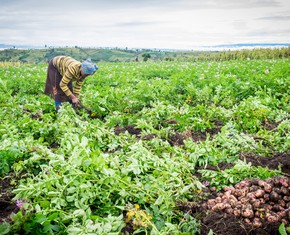The views expressed in our content reflect individual perspectives and do not represent the authoritative views of the Baha'i Faith.
In the “great wealth transfer,” currently occurring between older Americans and their heirs, we’re witnessing the largest inheritance ever given by one generation to the next: $72 trillion dollars.
But because of the massive disparity between the world’s wealthiest and the world’s poorest peoples, this unprecedented transfer will likely increase economic inequality, widen the wealth gap, and worsen the social strains it causes.
For Baha’is, that’s the wrong outcome. Instead, as the Baha’i teachings clearly point out, the law of God in this day demands that neither excessive wealth nor excessive poverty should exist. In his book Some Answered Questions, Abdu’l-Baha said:
… the root cause of these difficulties lies in the law of nature that governs present-day civilization, for it results in a handful of people accumulating vast fortunes that far exceed their needs, while the greater number remain naked, destitute, and helpless.
RELATED: Beginning Our Conversation about Death: Write Your Will!
Unfortunately, in our modern global economy, the old saying “The rich get richer, and the poor get poorer” seems to accurately describe today’s reality.
Many prominent economists have actually begun to pay much more attention lately to the underlying structures beneath this truism, concluding that the ongoing accumulation of capital by the very wealthy — especially when transferred from one generation to the next — tends to create a greater and greater gap between the rich and the poor. Thomas Piketty, the well-known French economist, author, and the Co-Director of the World Inequality Lab, described that phenomenon in his book “Capital in the 21st Century”:
When the rate of return on capital significantly exceeds the growth rate of the economy (as it did through much of history until the nineteenth century and as is likely to be the case again in the twenty-first century), then it logically follows that inherited wealth grows faster than output and income.
In other words, when we concentrate inherited wealth in the hands of one small upper economic class of people — which has definitely happened in today’s world of the super-rich — and the investment and interest returns on that large accumulation of capital remain high, the wealth becomes self-perpetuating, building dynasties that benefit the few at the expense of the many.
So the rich get richer — much richer — and we end up with a society dominated by the economic and political power of those who inherit enormous wealth and use it to influence the course of history and perpetuate their economic dominance.
What’s wrong with that? If you’re wealthy, it’s more likely than not that you inherited much of your capital, and just having all that inherited wealth serves as a disincentive to work productively. But more importantly, concentrating wealth in the hands of a few, according to the Baha’i teachings, can produce a monopoly on wealth controlled by a limited number of people, which then creates fundamental inequality in society. Abdu’l-Baha, in Some Answered Questions, described this condition as “at once contrary to justice, to humanity, and to fairness:”
Thus you can observe, on the one hand, a single person who has amassed a fortune, made an entire country his personal colony, acquired immense wealth, and secured an unceasing flow of gains and profits, and, on the other, a hundred thousand helpless souls — weak, powerless, and wanting even a mouthful of bread. There is neither equality here nor benevolence. Observe how, as a result, general peace and happiness have become so wanting, and the welfare of humanity so undermined, that the lives of a vast multitude have been rendered fruitless! For all the wealth, power, commerce, and industry are concentrated in the hands of a few individuals, while all others toil under the burden of endless hardships and difficulties, are bereft of advantages and benefits, and remain deprived of comfort and peace. One must therefore enact such laws and regulations as will moderate the excessive fortunes of the few and meet the basic needs of the myriad millions of the poor, that a degree of moderation may be achieved.
So rather than selecting a few close relatives as heirs and burdening them with tremendous wealth and the trying tests it inevitably imposes, the Baha’i policy recommends a wider, voluntary distribution among many.
For example, when a person dies without leaving a will, Baha’i law says the value of the remaining assets should be divided in certain proportions among seven classes of inheritors — children, wife or husband, father, mother, brothers, sisters, and teachers. In the absence of one or more of these classes, the share which would belong to them goes to the public treasury, to be expended on the poor, the orphans, and the widows, or on useful public works.
RELATED: What Should My Will and Testament Include?
This unique model of inheritance accomplishes several important goals — it gives opportunities to those who never had them before, helps fairly and equitably distribute and diminish large estates and concentrations of inherited wealth, and also suggests allocating a share of the total inheritance to a general storehouse of funds for those in need. In this way, the Baha’i teachings on inheritance recommend a pathway to a much more balanced and equitable future society where wealth is shared, not hoarded.
When he first encountered the terrible poverty in industrialized Edwardian England in the early 20th century, Abdu’l-Baha outlined the Baha’i vision of a more equitable future, as reported in the Baha’i magazine Star of the West:
The time will come in the near future when humanity will become so much more sensitive than at present that the man of great wealth will not enjoy his luxury, in comparison with the deplorable poverty about him. He will be forced, for his own happiness, to expend his wealth to procure better conditions for the community in which he lives.
This has already begun to happen all around the world. So, if you’re fortunate enough to have assets you plan to bequeath after your passing, remember this advice from the Baha’i teachings when you’re writing your will:
Gracious God! How can one see one’s fellow men hungry, destitute, and deprived, and yet live in peace and comfort in one’s splendid mansion? How can one see others in the greatest need and yet take delight in one’s fortune? That is why it has been decreed in the divine religions that the wealthy should offer up each year a portion of their wealth for the sustenance of the poor and the assistance of the needy. This is one of the foundations of the religion of God and is an injunction binding upon all. And since in this regard one is not outwardly compelled or obliged by the government, but rather aids the poor at the prompting of one’s own heart and in a spirit of joy and radiance, such a deed is most commendable, approved, and pleasing.
This is the meaning of the righteous deeds mentioned in the heavenly Books and Scriptures.
















Comments
Sign in or create an account
Continue with Googleor